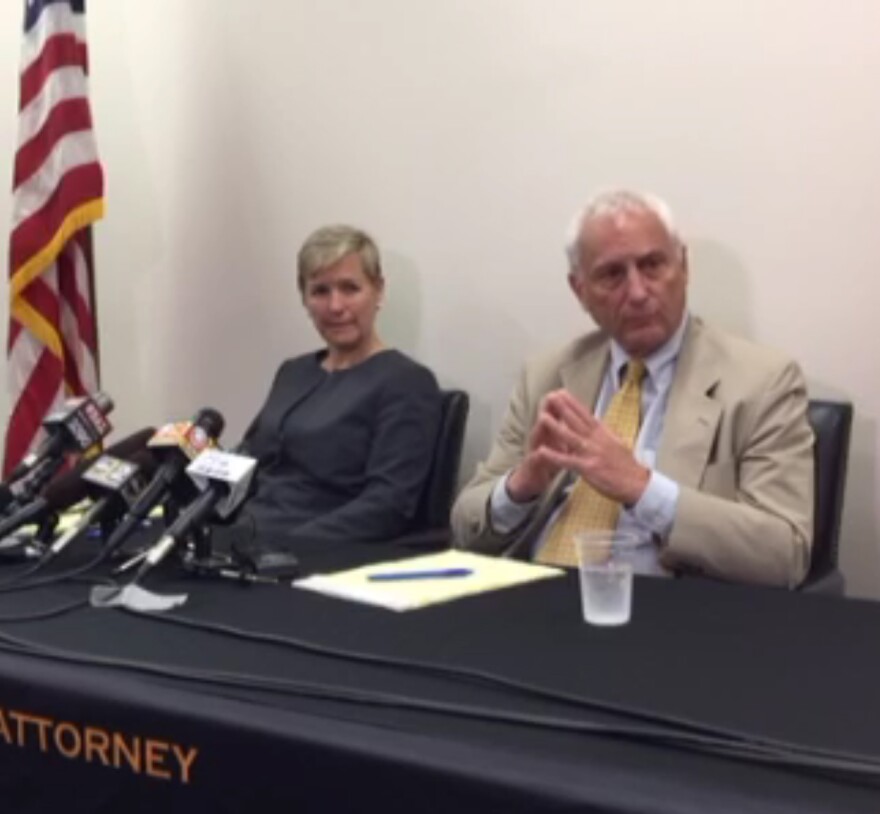Prosecutors defended Thursday their investigation and strategy in the case of Freddie Gray, who died from injuries suffered in police custody.
Chief Deputy State’s Attorney Michael Schatzow said in a news conference they believed in the case and were prepared to continue with the trials. But State’s Attorney Marilyn Mosby determined that they had to be realistic.
“Mrs. Mosby correctly determined that we had to face the reality [that] defendants would select judge trials,” he said. “And that this judge made determinations and that he had seen the significant portions of the evidence that he was going to see.”
Schatzow added he “obviously” disagrees with Williams’ view and that “there should have been guilty verdicts.”
It was the first time Schatzow and Deputy State’s Attorney Janice Bledsoe have spoken publicly since trials ended and Baltimore Circuit Judge Barry Williams lifted a gag order he had imposed before the first trial started.
Prosecutors dropped charges against three of the six accused officers – Officers Garrett Miller, William Porter and Sgt. Alicia White –Wednesday. Williams acquitted Officers Edward Nero, Caesar Goodson and Lt. Brian Rice after their trials.
The investigation
When Mosby announced charges against the six officers in May 2015, she claimed her office had conducted an independent investigation with the help of the city sheriff’s office.
Defense lawyers claimed Wednesday no such investigation took place. And Maj. Samuel Cogan, of the sheriff’s office, said recently in an affidavit that he was not involved in the investigation “whatsoever.”
Schatzow said the investigators on the state’s attorney’s staff “went out and gathered information.”
Bledsoe said their investigators were in Sandtown-Winchester shortly after Gray was hospitalized for the injuries incurred in the back of a police van in April 2015.
“[The investigators] continued even when the task force was put in place to assist the police in getting business videos and identifying CCTV camera videos,” she said, “footage that we wanted that had not been requested yet by BPD.”
Schatzow added neither he nor Bledsoe were rushed to indict the six officers and that they didn’t overlook anything.
The prosecutors said they had difficulty gathering evidence.
Bledsoe said they obtained search warrants for the officers’ personal cell phones. But city police did not execute the warrants before they expired.
Schatzow said it was kind of hard to explain what they were hoping to find “without having the cellphones.”
“Obviously, it would have shown what communications they were having and who they were having communications with and when.”
Mosby had complained Wednesday of a “reluctance and obvious bias” by certain police officers “at every stage of the investigation.”
Baltimore Police issued a statement in which they said they would “not engage in public banter with our criminal justice system partners, nor will we entertain media requests that seek responses to remarks made by persons now offering retrospective opinions.”
The theory
When Gray was arrested, he was placed in the van – handcuffed with his legs shackled – without being belted in.
Prosecutors argued during the trial that Gray’s death from a broken neck occurred because none of the officers involved followed a police department policy requiring prisoners to wear seatbelts.
Schatzow said the violation of a police policy, known as general orders, is relevant when determining whether someone broke the law.
“We start with a basic proposition that under the Constitution of the United States and the Constitution of Maryland that the police have a duty to ensure the safety of people in their custody,” he said. “That’s what we thought was an important indication that the involved officers who were charged with that specific violation had not done what they were supposed to do.”
But Judge Williams ruled that a violation of a general order does not indicate criminal negligence.
Schatzow said they were prepared for a jury trial, but three of the defendants – Nero, Goodson and Rice – elected bench trials. He insisted they adjusted for the bench trials.
“You could ask Judge Williams how effective the adjustment was,” he quipped, “but, yes, we like to think we made the adjustment.”
The only jury trial in the case – Porter – ended in a hung jury last December.





